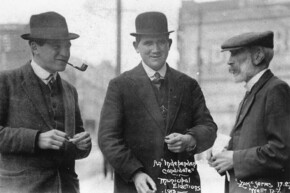
MORIARTY, John Joseph
| Service Number: | 7285 |
|---|---|
| Enlisted: | 29 May 1916 |
| Last Rank: | Corporal |
| Last Unit: | 14th Infantry Battalion |
| Born: | Dunsandel, North Canterbury, New Zealand, 16 November 1883 |
| Home Town: | Melbourne, Melbourne, Victoria |
| Schooling: | Roman Catholic Boys School, Ashburton, Canterbury, New Zealand |
| Occupation: | Bookkeeper |
| Died: | Killed in Action, France, 8 August 1918, aged 34 years |
| Cemetery: |
Cerisy-Gailly Military Cemetery Plot I, Row B, Grave No. 27. |
| Memorials: | Australian War Memorial Roll of Honour |
World War 1 Service
| 29 May 1916: | Enlisted AIF WW1, Private, 7285, 14th Infantry Battalion | |
|---|---|---|
| 19 Feb 1917: | Involvement Private, 7285, 14th Infantry Battalion, --- :embarkation_roll: roll_number: '11' embarkation_place: Melbourne embarkation_ship: HMAT Ballarat embarkation_ship_number: A70 public_note: '' | |
| 19 Feb 1917: | Embarked Private, 7285, 14th Infantry Battalion, HMAT Ballarat, Melbourne | |
| 8 Aug 1918: | Involvement Corporal, 7285, 14th Infantry Battalion, --- :awm_ww1_roll_of_honour_import: awm_service_number: 7285 awm_unit: 14 Battalion awm_rank: Corporal awm_died_date: 1918-08-08 |
Help us honour John Joseph Moriarty's service by contributing information, stories, and images so that they can be preserved for future generations.
Add my storyBiography contributed by Stephen Brooks
John Joseph Moriarty was New Zealand born and joined the 14th Battalion during September 1917. He was evacuated to England three weeks later with gunshot wounds to his thigh.
He rejoined the 14th Battalion in late November 1917. In early 1918 he was recommended for the award of a Military Medal, but it was never awarded. The recommendation states “For courage and devotion to duty during the Battalion’s tour of duty in the line near Hollebeke from 29 January 1918 to 5 February 1918. He was in charge of ration parties from support to front lines which made three trips nightly. On the nights of 29 January his party suffered heavy casualties from gas shells and although suffering from the effects of gas he completed the three trips with fresh men. It was due to the cheerful spirit of the NCO and the splendid example he sets his party, that the rations reached the front line on time and in good condition. He carried out these duties nightly until the Battalion was relieved.”
He was treated for mustard gas poisoning during February 1918. He was promoted to Corporal only a few months before his death.
His parents were Michael and Mary Moriarty, of Ashburton, New Zealand.
Biography contributed by Peter Moriarty
John Joseph Moriarty, born at Dunsandel, North Caterbury, New Zealand, on 16 November 1883 was the fourth son of Irish born parents Michael and Mary Moriarty. He was raised in Ashburton, Canterbury. He became a gifted orator. He worked with his brother Daniel in the furniture trade, before joining the staff of the New Zealand Tablet, Catholic Newspaper, where he worked until he departed with his elder brother Bartholomew to work as bookkeeper for the architectual firm of Lusk and Moriarty in Melbourne, Victoria, Australia. He arrived in Melbourne in March 1914. In addition to his work with his brother's firm, he also threw himself wholeheartedly in the Catholic Federation movement being a regular speaker at gatherings all over Victoria. It was said that being a polished and experienced speaker he was extremely popular with he audiences.
It was during a visit to give such an address at Geelong on 27 May 1916 that he became aware that his friend and fellow activist J T Kerley of Geelong had enlisted he resolved to do likewise. He did so on 29 May 1916. Two of his younger brothers, Charles and Maurice, enlisted at around the same time in New Zealand - both survived the war.
Following completion of his training he was transferred to the 24th Reinforcements for the Victorian 14th Battalion, part of the 4th Brigade of the 4th Division of the AIF, then fighting in France.
John embarked the HMAT Ballarat with the 24th Reinforcements in Melbourne on 19 February 1917. The ship was torpedoed on 25 April 1917 but did not sink until the following day allowing all troops to be rescued.
John was wounded in action while fighting at Polygon Wood on 28 September 1917, suffering a gunshot wound to the thigh. He rejoined his unit in December 1917. He was gassed on 13 Februay 1918. He was nominated for a Military Medal (never awarded) for his conduct at that time. He returned to his unit in time for the great German offensive of March 1918 in which his unit served with distinction.
John was promoted to corporal on 12 May 1918, but was killed in action at the Battle of Amiens on 8 August 1918, a memorable day in Australian military hostory but a very sad day for his family and friends. We have no doubt that General Monash would have accepted that John had "worthily risen to the occasion" as he had requested of his soldiers in his letter to the soldiers of the Australian Army Corps the previous day.
News of John's death spread quickly to both Australia and New Zealand where he was well rememberd in eulogy and personal tribute appearing in the New Zealand Tablet and the Melbourne Advocate, amongst others. John was also included on the Roll of Honour of those from Ashburton, New Zealand, who had fallen in the Great War.










